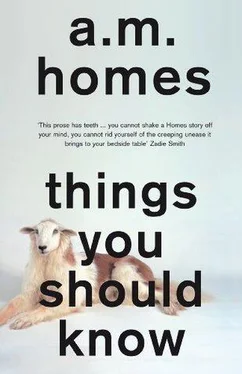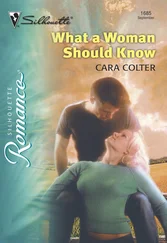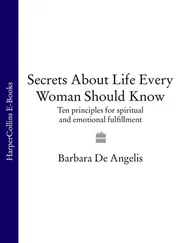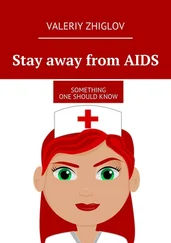It was the day after school ended. My mother had put me on the plane with a list of instructions/directions for my father, written out longhand on three sheets of legal paper, stuffed into one of Dr. Frankle’s embossed envelopes. I was to be returned on or by the twenty-first of August, in good time for the usual back-to-school alterations: haircut, fresh jeans, new sneakers, book bag. I was only just becoming aware of how much everything was the product of a negotiation or a fight.
“Let’s find Henry,” Mrs. Henry suggested.
Let’s not, I thought.
We were at the age where just showing up was frightening. You never knew who or what you might meet, a twelve-foot giant with a voice like a tuba, or Howdy Doody himself. Without warning, a body could go into spasm, it could stretch itself out to a railroad tie, it could take someone familiar and make them a stranger. A whole other person could claim the name, address, phone number, and fingerprints of a friend. There was the possibility that in those ten missing months a new life had been created, one that intentionally bore no relation to the past.
“Don’t worry, they’ll find your luggage,” Mrs. Henry said. “They’ll check the airport in Boston and the next plane coming in, and when they’ve got it, they’ll deliver it out to the house. You’ll have it by suppertime. Let’s go,” she said. “Makes no sense to wait here.”
The automatic doors popped open. Henry stood there, arms open, exasperated.
“What the hell is going on?” he screamed. “They’re about to tow our car. They asked me for my license!”
Mrs. Henry turned red. She tugged on the strap of my shoulder bag. We ran forward.
“I’ve never heard of anything taking so long,” Henry said when we got outside.
There was no tow truck. There was nothing except a long line of cars dropping off people, and men in red caps going back and forth from the cars to the terminal wheeling suitcases that weren’t lost yet. There wasn’t even a ticket on the Henrys’ windshield.
And Henry wasn’t a giant. He wasn’t six feet tall, either. He was skinny, with shoulders that stuck straight out of him like the top of a T square.
“What happened?” he asked.
“The airline has misplaced your friend’s luggage.”
He turned to me, finally noticing I was there, I existed. “Why’d you get glasses?”
“Blind,” I said.
Five years ago, before I ever met him, Henry was offered to me by my father as a kind of bribe.
“Philadelphia will be fun,” my father had said. “We bought this house especially for you. There’s a boy your age living next door; you can be best friends.”
My first day there I stood three-foot-something, waiting smack in the middle of the treeless, flowerless, nearly grassless front yard as nonchalantly as a seven-year-old could. I knew no other way of announcing myself. When the sun had crossed well over its midday mark, when what seemed like years had passed, a station wagon pulled into the driveway just past me and the promised boy jumped out and without stopping ran toward the kitchen door of his house. The screen door opened, but instead of admitting him, a yellow-rubber-gloved hand pushed the boy out again. The body attached to the hand followed and Mrs. led Henry to the edge of their yard and nodded in my direction.
“Henry, this is your new friend. He’s here for the whole summer,” she said.
“Bye,” Henry said, taking off again in the direction of the kitchen door, whipping open the screen, and vanishing into the house.
“You can’t stand outside all summer, you’ll be a regular Raisinette, go on, after him,” Mrs. Henry said, clapping her hands.
The geography of the Henrys’ house was the exact same as my father’s house, but theirs was more developed. The top floor had blue carpet; the middle level, yellow; and the lower level was green. The sky, the sun, the lawn. It made perfect sense. It was beautiful. Everywhere I’d ever lived the floors were wooden or carpeted a neat and dull beige or gray. Here I had the sensation of floating, skimming through the rooms like a hovercraft. I went through the house, stunned by the strangeness of being alone among the lives of others.
I found Henry on the lower level setting up a Parcheesi board.
“Do you know how to play or do I have to teach you?”
“I know how,” I said.
“That’s a relief. You don’t look like you know anything.”
I didn’t answer.
“Can you swim?”
I nodded.
“Tomorrow we’ll go to the pool.”
He hurled a series of questions at me like rockets, little hand grenades. I ducked and bobbed; I answered as best I could. It was a test, an application for friendship.
“I’m allowed to go off the diving board but I don’t like it,” he said. “But I don’t tell anyone that. If someone is going, I go too, but it’s nothing I’m in a rush to do. You first,” he said, dropping the dice into my hand. I started to shake them. He immediately stopped me.
“We don’t play that way,” he said. “You go like this.” Between his thumb and forefinger, he held one up in the air then dropped it with a whirling twist. Before the first one stopped spinning, he dropped the second one the same way. The dice splashed down onto the board, knocking over my marker, giving me a six and a four. “See,” he said, moving my marker for me. “It’s better that way.”
“I should go home,” I said when the game was over, when he’d played the whole thing for both of us, when I’d never touched the marker or the dice.
“Are you sure you wouldn’t like to have a snack?” Mrs. asked me as I headed for the screen door. “I made cream-filled cupcakes.”
“The ones with white stuff inside,” Henry said.
“You can make cupcakes like that?”
“Yes.” She smiled at me.
Every year just as I started to have a sense of how things were laid out, of where Philadelphia started and stopped, it was time for me to leave. The Henrys’ car wound down the streets with me pressed to the window, wondering where the hell we were.
“Where’s baby June?” I asked, my twelve-year-old voice cracking with what I thought was middle age or Parkinson’s disease.
“Day camp,” Mrs. Henry said.
Baby June’s real name was Constance, but since her mission in life appeared to be a well-studied imitation of Mrs., everyone except Mrs. and Mr. called her baby June.
Henry and I were quiet. There was the familiar awkwardness of beginning again, of seeing a body once more after months away. In between, we’d talked a couple of times, signed our names to birthday cards picked out by mothers in a hurry, we’d given the okay to a present we knew would be perfect only because we wanted it so bad for ourselves. But that was about it.
“You’d better check in,” Mrs. said when we pulled into the driveway. “Then come over for lunch. We’ll be waiting.”
“You’ll be waiting,” Henry said, slamming the car door. “I’m eating now.”
Except for the hum of the air-conditioning, which was running even though it was only seventy-some degrees out, my father’s house was without signs of life.
I left my carry-on in the hall and called my mother. Dr. Frankle answered the phone. I didn’t tell him his luggage was missing.
“Is my mother there?”
“She’s on the Lifecycle,” he said, and then there was silence.
“Could I talk to her please?”
“I’ll have to get the cordless.”
“Thank you,” I said. There was the longest silence, as though Dr. F. thought if he waited long enough to get my mother, I’d grow up and be gone.
“You’re there,” my mother said, out of breath.
“I’m here.”
“That was fast.”
Читать дальше












